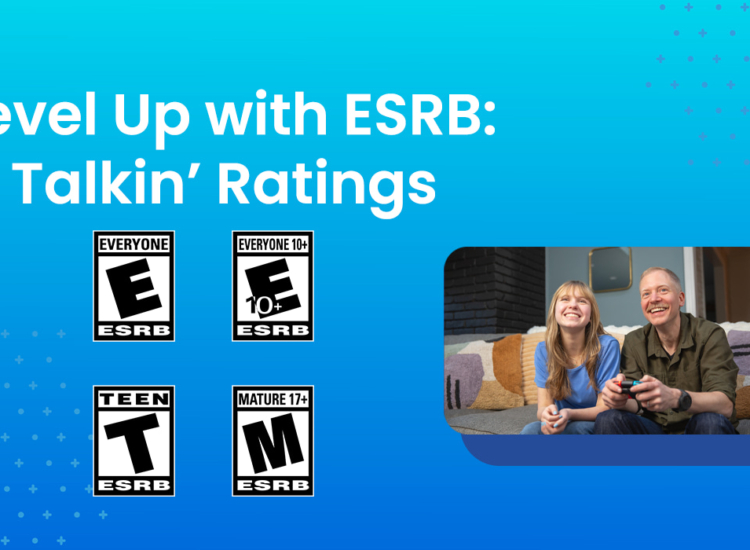Research: Gamer Parents Are the Future
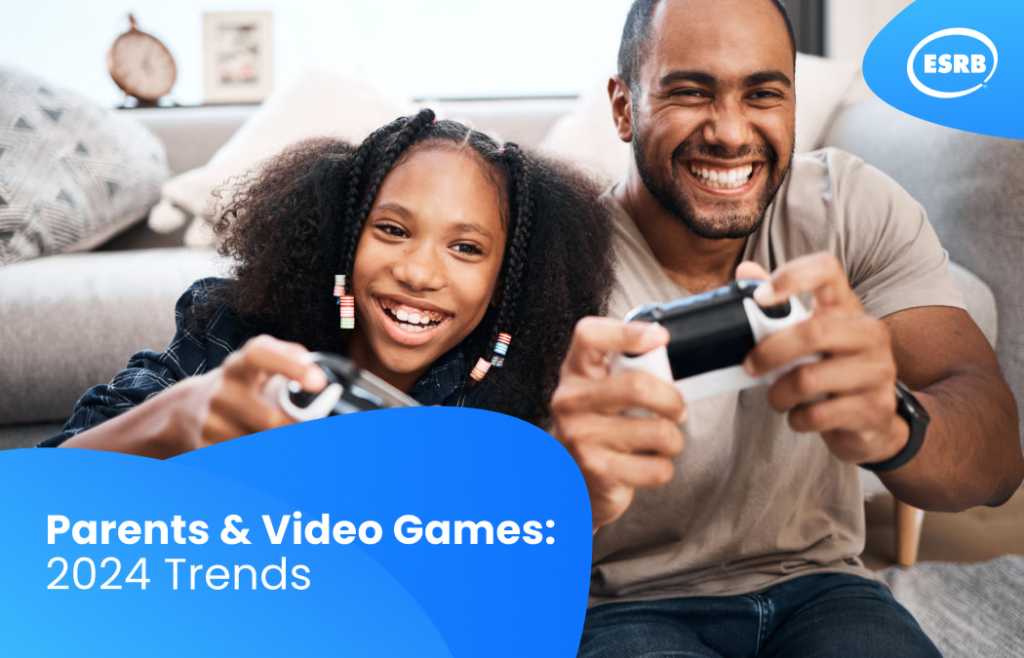
Every year ESRB conducts a survey of parents with kids (ages 3 – 15) who play video games. One of the major goals of this research is to make sure ESRB’s age and content ratings for video games and apps are still relevant and of use to parents and caregivers. Spoiler alert: They are.
With this research we tend to also uncover interesting trends among parents and caregivers as they navigate how to manage their kids’ video games. Some of the trends we discovered in 2024 are remarkably similar to findings in past years. But others are more surprising and indicate how modern parents approach their kids’ video game experiences.
Trend: Parental Awareness & Use of ESRB Ratings Remains Extremely High
In years past we’ve discussed how consistently high awareness and use of the ESRB rating system is among parents. We’re happy to report that this trend continues into 2024.
According to the research, 84% of parents with kids who play video games tell us that they are aware of the ESRB rating system, the same as last year’s survey. Meanwhile, 78% say they use the ESRB rating system regularly (“every time” or “most of the time”) when deciding which video games are appropriate for their kids, a 5% increase over last year.
Trend: Parents Say All Three Parts Are Important, But Importance Shifts Depending on the Age of the Child
We’ve found that parents still think all three parts of the rating system are important. However, it was clearer this year that the importance of each part shifts as children age.
A large majority of parents say all three parts of the rating system are important:
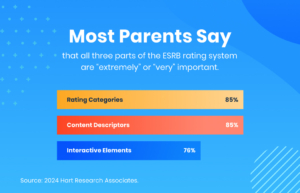
These results illustrate the value of each part of the rating system, but the wrinkle is that the level of importance shifts as a child matures. For example, the research tells us that Rating Categories and Content Descriptors are most valuable when children are younger. This is likely because younger kids are more often playing games researched and purchased or downloaded by their parents primarily based on the age appropriateness of the content, and their experiences are tightly managed. As kids mature, many parents begin to ease up on the nature of the content in the games their teens can play and prioritize Interactive Elements, which let you know when a game includes features like online play with others and in-game purchases.
Trend: Gamer Parents Are on the Rise!
Parents are more familiar with video games than any past generation, according to this year’s responses. Not only does this impact how parents pick appropriate games and manage their kids’ experiences, but it brings video games into the home as a go-to family activity.
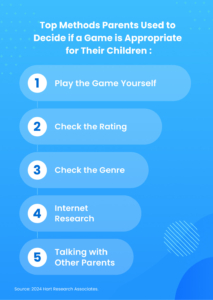 According to our survey more than half of parents say they are knowledgeable about video games and 58% of parents identify themselves as “gamers.” This increased familiarity has resulted in video games turning into a family activity for many.
According to our survey more than half of parents say they are knowledgeable about video games and 58% of parents identify themselves as “gamers.” This increased familiarity has resulted in video games turning into a family activity for many.
In fact, 75% of parents say they play video games (computer games, video games, or mobile games) with their kids regularly (“every day” or “every week”).
Given the above, it should come as no surprise that parents still say that playing a game remains the top method used to decide if it is appropriate for their children. As with 2023, checking the ESRB-assigned rating information is a close second.
Trend: Screen Time is Still the “Final Boss” for Parents
Screen time has long been the number one challenge for parents when it comes to video games. Of course, parents still heavily consider content and online safety, but managing time spent playing remains the “Final Boss.”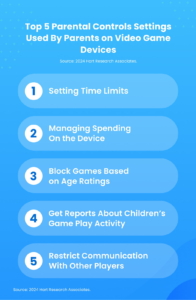
For the past few years screen time has been elevated as parents’ biggest challenge when managing video games in the home and parents say this is no different in 2024. The good news is that 80% of parents are using parental controls on at least one of the game devices in the home, and they are most often activating controls to manage screen time.
ESRB provides step-by-step parental controls guides at ParentalTools.org. Visit ESRB’s Family Gaming Guide for more tips to help keep your kids’ video game play appropriate and maintain peace of mind.
 Patricia E. Vance is the president of the Entertainment Software Rating Board (ESRB). In her position, she leads the teams responsible for assigning age and content ratings to video games and apps, enforcing marketing guidelines adopted by the video game industry, and operating ESRB Privacy Certified, an FTC-sanctioned COPPA Safe Harbor Privacy seal certification program.
Patricia E. Vance is the president of the Entertainment Software Rating Board (ESRB). In her position, she leads the teams responsible for assigning age and content ratings to video games and apps, enforcing marketing guidelines adopted by the video game industry, and operating ESRB Privacy Certified, an FTC-sanctioned COPPA Safe Harbor Privacy seal certification program.

